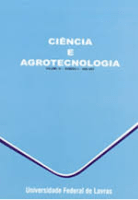
CIENCIA E AGROTECNOLOGIA
Scope & Guideline
Empowering Research in Agriculture and Food Sciences
Introduction
Aims and Scopes
- Agricultural Innovation and Technology:
The journal emphasizes the application of innovative technologies in agriculture, including precision farming, biotechnology, and artificial intelligence to improve crop management and yield. - Sustainable Practices in Agriculture:
Research focusing on sustainable agricultural practices, including organic farming, agroecology, and resource-efficient techniques to minimize environmental impact and enhance soil health. - Crop and Livestock Management:
Studies on the management of various crops and livestock, including genetic improvement, pest management, and resource optimization for better productivity and resilience. - Food Quality and Safety:
Investigations into post-harvest technologies, food processing, and the nutritional quality of agricultural products to ensure food safety and enhance consumer health. - Microbial and Plant Interactions:
Research on the interactions between plants and microorganisms, including the use of beneficial microbes in soil and plant health, biocontrol agents, and plant-microbe relationships.
Trending and Emerging
- Artificial Intelligence and Data Analytics in Agriculture:
There is a growing trend towards utilizing artificial intelligence and data analytics for crop management, yield prediction, and agricultural decision-making, which enhances efficiency and productivity. - Climate Resilience and Adaptation Strategies:
Research focusing on climate resilience, including studies on drought-resistant crops and water management practices, is gaining traction as agricultural systems adapt to changing climate conditions. - Biotechnology and Genetic Engineering:
An increase in publications related to biotechnology, including CRISPR and other genetic modification techniques, highlights a trend towards enhancing crop traits and improving food security. - Sustainable Waste Management in Agriculture:
Emerging interest in the utilization of agricultural by-products and waste management strategies, such as composting and bioenergy production, reflects a growing awareness of sustainability in agricultural practices. - Microbial Biotechnology and Phytopathology:
Research on microbial applications in agriculture, including biocontrol agents and plant growth-promoting rhizobacteria, is becoming more prominent, indicating a shift towards biological solutions for agricultural challenges.
Declining or Waning
- Traditional Crop Breeding Techniques:
There is a noticeable decrease in studies focusing solely on traditional breeding techniques, as more research is shifting towards genetic engineering and biotechnology. - Invasive Species Management:
Research on the management of invasive species has become less frequent, possibly due to a shift towards integrated pest management approaches that focus on holistic ecosystem management. - Soil Chemistry and Fertility Studies:
Although still important, the focus on conventional soil chemistry and fertility studies appears to be waning in favor of more comprehensive studies that integrate soil microbiome research.
Similar Journals

TROPICAL AGRICULTURE
Nurturing the growth of agronomic research in the tropics.Tropical Agriculture is a reputable journal dedicated to advancing knowledge and research in the fields of Agronomy and Development, with a particular emphasis on tropical farming practices and agricultural innovation. Published by the University of the West Indies, this journal serves as a crucial resource for researchers, professionals, and students engaged in the complexities of agriculture in the tropics. Established in 1979, it has witnessed significant contributions and continues to facilitate scholarly discussions through its quarterly publications. While the journal currently holds a Q4 ranking in both the Agronomy and Development categories, its commitment to fostering research excellence positions it as a pivotal platform for emerging studies and regional agricultural advancements. Although not an open-access publication, it provides critical insights and localized research that greatly benefit the agricultural community, particularly within the Caribbean context. Researchers and professionals in the field can rely on this journal for insightful content on tropical agricultural challenges and developments, enhancing knowledge dissemination and application across related disciplines.

PESQUISA AGROPECUARIA BRASILEIRA
Unlocking the potential of agronomy, horticulture, and soil science.PESQUISA AGROPECUARIA BRASILEIRA, an esteemed journal published by EMPRESA BRASIL PESQ AGROPEC, serves as a vital platform for disseminating research in the realms of agronomy, animal science, horticulture, and soil science. With an ISSN of 0100-204X and an e-ISSN of 1678-3921, this Open Access journal has been at the forefront of agricultural research since its initiation in 1978, and has been fully accessible to researchers globally since 1999. Hailing from Brazil, it is dedicated to advancing knowledge in agricultural practices and sustainability, making it an essential resource for academics and professionals alike. The journal is ranked in the Q3 and Q4 quartiles across various categories, reflecting its impact within the scientific community, while its Scopus rankings illustrate its commitment to high-quality scholarship. With its rigorous peer-review process, PESQUISA AGROPECUARIA BRASILEIRA not only promotes scholarly engagement but also plays a crucial role in addressing agricultural challenges, thus appealing to a broad audience of researchers, professionals, and students seeking to contribute to this dynamic field.
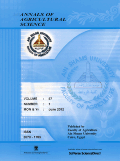
ANNALS OF AGRICULTURAL SCIENCES
Empowering the Agricultural Community Through Open Access ResearchANNALS OF AGRICULTURAL SCIENCES, published by Elsevier, stands as a leading open access journal dedicated to the multifaceted field of agricultural sciences. Since its inception in 2011, this journal has served as a pivotal platform for the dissemination of high-quality research, covering areas such as agronomy, animal science, horticulture, food science, plant science, and soil science. With an impressive Q1 ranking across multiple disciplines and notable positions in Scopus Ranks—including #6 in Animal Science and Zoology and #3 in Horticulture—this journal is recognized globally for its significant contribution to advancing agricultural innovations. The journal caters to a diverse audience of researchers, professionals, and students, providing them with open access to cutting-edge studies that address critical issues in agricultural productivity and sustainability. Its commitment to high-impact research ensures that articles contribute meaningfully to the scientific community, fostering advancements in agricultural practices and policies.

Revista Fitotecnia Mexicana
Exploring the Depths of Plant Science and GeneticsRevista Fitotecnia Mexicana is a prominent academic journal published by the SOC MEXICANA FITOGENETICA, dedicated to advancing knowledge in the fields of agronomy, crop science, genetics, horticulture, and plant science. With its establishment dating back to 2007 and currently running through 2024, this journal serves as an important platform for researchers, professionals, and academic institutions interested in plant genetic resources and agricultural innovations. Although it holds a Q4 quartile ranking in various categories and is positioned within the lower percentiles in Scopus rankings, it provides crucial insights and opportunities for emerging ideas and local research initiatives. Based in Mexico, and with its indexed ISSN 0187-7380, the journal plays an important role in stemming from the rich agricultural heritage of the region. The lack of open access options underscores the depth of curated content provided, making it a valuable resource for professionals seeking to expand their expertise in the sector.
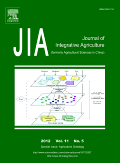
Journal of Integrative Agriculture
Elevating Agricultural Research to New HeightsJournal of Integrative Agriculture, published by Elsevier Science Ltd, stands as a leading platform for innovative research at the intersection of agricultural sciences. With a significant focus on integrative approaches, this journal has established itself within the academic community, reflecting its excellence through impressive Impact Factor rankings and a consistent Q1 category status in multiple fields, including Agronomy, Animal Science, and Ecology. The journal spans a wide range of topics, making it a critical resource for exploring advancements in Biochemistry, Food Science, and Plant Science. With its diverse Scopus rankings—from Rank #3 in Food Animals to Rank #14 in Animal Science—it serves as a vital repository for cutting-edge research that influences both scientific inquiry and practical applications in the agricultural domain. Operating from China and accessible through open access options, the Journal of Integrative Agriculture aims to foster collaborative research and knowledge exchange among scientists, professionals, and students worldwide, supporting the growth and sustainability of agricultural practices.

AgroLife Scientific Journal
Unlocking Insights in Agriculture and Veterinary Medicine.AgroLife Scientific Journal, published by the University of Agronomic Sciences and Veterinary Medicine Bucharest, is a distinguished platform for disseminating research within the field of agricultural and biological sciences. Established as an Open Access journal since 2012, it aims to facilitate knowledge sharing and enhance accessibility to vital information in agriculture, veterinary medicine, and related disciplines. With an ISSN of 2285-5718 and E-ISSN of 2286-0126, the journal welcomes innovative research articles, review papers, and case studies that explore contemporary challenges and breakthroughs in the agro-scientific community. It is noteworthy that in the 2023 Category Quartiles, the journal is classified as Q4, reflecting its role in the broader academic landscape, though with significant growth potential as indicated by its Scopus Rank of #152 out of 193. Researchers, professionals, and students can leverage the journal's open access model to remain at the forefront of agricultural research while contributing to a collaborative scholarly conversation.
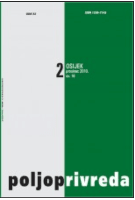
Poljoprivreda
Advancing agricultural knowledge for a sustainable future.Poljoprivreda is a distinguished open-access journal dedicated to the field of agronomy and crop science, published by the FAC Agriculture Osijek in Croatia. Since its inception in 2000, the journal has been committed to disseminating high-quality research that informs both academic and practical advancements in agriculture. With an ISSN of 1330-7142 and an E-ISSN of 1848-8080, Poljoprivreda provides a vital platform for researchers, professionals, and students to engage with the latest findings and methodologies in agronomy, contributing significantly to the enhancement of agricultural practices in Croatia and beyond. Although currently ranked in the 22nd percentile within its category according to Scopus, the journal aspires to elevate its standing by welcoming innovative research that addresses contemporary challenges within the agricultural sciences. By fostering open access since 2000, Poljoprivreda ensures that its scholarly content is freely available, promoting wider dissemination and collaborative opportunities among researchers globally.
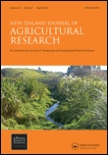
NEW ZEALAND JOURNAL OF AGRICULTURAL RESEARCH
Connecting Researchers to Drive Agricultural ExcellenceNEW ZEALAND JOURNAL OF AGRICULTURAL RESEARCH is a prestigious, peer-reviewed journal published by Taylor & Francis Ltd that has been at the forefront of agricultural science since its inception in 1958. With a strong focus on the fields of Agronomy and Crop Science, Animal Science and Zoology, Plant Science, and Soil Science, this journal has established itself in the academic community, achieving a notable Q2 ranking in various agricultural categories as of 2023. The journal thrives on its commitment to disseminating cutting-edge research and innovative practices that address contemporary challenges in agriculture. Although it does not currently offer an open access option, its valuable contributions can be accessed through various academic platforms, ensuring that vital research reaches a wide audience of researchers, professionals, and students globally. The journal's continued relevance and authority are reflected in its strong Scopus rankings, further emphasizing its role as a critical journal within the agricultural sciences.
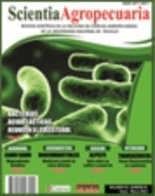
Scientia Agropecuaria
Championing the science of agriculture for a better tomorrow.Scientia Agropecuaria, an esteemed journal published by the Universidad Nacional de Trujillo’s Faculty of Agricultural Sciences, is dedicated to advancing research in the fields of Agronomy, Animal Science, and Soil Science. With a rich heritage since its inception, the journal has embraced Open Access since 2010, ensuring global dissemination of knowledge to researchers and practitioners. Hailing from Trujillo, Peru, it plays a vital role in the scientific community, capturing a Q3 ranking across multiple categories in the 2023 category quartiles, which reflects its growing influence, supported by its commendable Scopus percentile rankings. The scope of the journal is to publish original research, reviews, and insights that address critical issues and innovations in agriculture and related fields, making it a key resource for researchers, professionals, and students aiming to stay abreast of cutting-edge developments. As the journal continues its convergence until 2024, it remains an important platform for impactful contributions to the agricultural sciences.

AGRONOMIA MESOAMERICANA
Inspiring change through cutting-edge agricultural research.AGRONOMIA MESOAMERICANA is a distinguished open-access journal published by UNIV COSTA RICA, dedicated to advancing knowledge in the fields of agronomy, crop science, food science, and soil science. Since its inception in 1990, the journal has provided a platform for researchers and professionals to disseminate their findings, contributing significantly to the agricultural sciences. With an E-ISSN of 2215-3608, it operates from Costa Rica, specifically from the Centro Investigaciones Agronómicas, situated in San José. Despite its current classification in the Q4 quartile for 2023 in the respective fields, it aims to stimulate academic discourse and inspire innovative solutions to pressing agricultural challenges. The journal attracts a diverse audience and encourages submissions that focus on sustainable practices, food security, and environmental stewardship, making it an essential resource for researchers, professionals, and students alike seeking to enrich their understanding and share crucial insights in the agronomy landscape. Open access ensures that all published research is freely available, fostering collaboration and knowledge exchange worldwide.